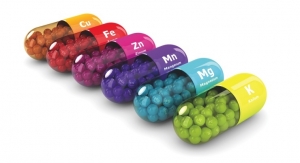Lisa Olivo, Associate Editor07.02.15
Malnutrition is a serious health epidemic globally, especially for the most vulnerable populations. Twelve percent of the global population is undernourished, according to a 2013 report from the UN's Food and Agriculture Organization (FAO), accounting for 842 million people. Furthermore, malnutrition is a cause of death for more than 3.1 million children under the age of five every year. UNICEF estimates 300 million children go to bed hungry each night and that 8,000 children under the age of 5 are estimated to die of malnutrition every day.
While many assume malnutrition is specific to just calorie intake, lack of critical nutrients also plays a huge part in this health crisis. Deficiency of essential nutrients such as vitamin A, iron or zinc are all linked to a higher risk of death.
It is this “hidden hunger” that can be exceptionally detrimental to developing children, according to Todd Johnson, director of marketing at Albion Minerals, Clearfield, UT.
For example, he explained, “Zinc and iron are desperately needed for brain and immune system development in growing children. There are a number of clinical studies that show the positive impact of calcium supplementation on bone mineral content in children from a variety of countries, such as the U.S., China and Nigeria.” Estimates show 25% of South African infants are born stunted, and 45% of the region’s children are vitamin A deficient, he added.
But nutrient intervention can make all the difference. Mr. Johnson cited a placebo-controlled trial that supplemented over 600 Nigerian toddlers (ages of 12-18 months) from three urban communities with calcium. Two communities received daily calcium supplements—one as calcium carbonate and the other as ground fish. The communities all received vitamin A as placebo. “Forearm Bone Mineral Density (BMD) was measured five times during 18 months of calcium supplementation,” he said. “During the 18 months of supplementation, an adjusted model demonstrated that the increase in both distal and proximal forearm BMD over time was significantly greater in the calcium-supplemented groups than in the placebo group.”
This is just one of many studies solidifying the importance of proper nutrition in childhood growth and development.
Enter e-Pap
To help fight malnutrition and worldwide hunger, Albion Minerals supplies its chelated minerals to populations in need.
“Albion minerals have been used for many years in a fortified porridge called e’Pap to boost the nutritional status of extremely malnourished individuals, as efforts are made to achieve ‘nutrient repleteness,” explained Mr. Johnson. The minerals utilized in e’Pap porridge are all mineral chelates from the company. “e’Pap primarily utilizes zinc and iron, which are urgently needed for immune system and brain development in young children. Albion has developed a unique focus on bioavailability that mimics nature and has played a critical role in the development of e’Pap.”
Albion’s chelated iron ingredients have also been used in Guatemala and Panama for fortification without changing the color or taste of sugar and other foods.
The increased bioavailability of the chelated minerals is an important component of why this porridge solution works. “In their ordinary form, minerals are inorganic elements and difficult for the body to absorb,” described Mr. Johnson. “Albion does the body’s work in advance by producing natural organic chelates that can pass easily through the intestinal wall.”
He added that organic mineral amino acid chelates have been scientifically proven to be more easily absorbed into the human body and to cause less gastric upset than inorganic minerals. That, he said, is in part due to the fact that that chelated minerals are absorbed intact and break apart in the intestine at the ideal point for absorption.
Additionally, inorganic sources of minerals have been known to cause irritation in the GI tract, as well as toxicity at larger doses. “Supplementing diets with inorganic minerals also causes mineral interactions, which suppress rates of absorption,” said Mr. Johnson. “Albion’s minerals chelated with amino acids have shown greater bioavailability and utilization in humans. Less irritation has been indicated in human studies from ingesting its minerals as mineral amino acid chelates.”
‘Remarkable Results’
Seeing the impact of e’Pap in improving health through nutrition, Albion’s minerals are being used in other fortification efforts around the globe. Mr. Johnson stated, “Fieldwork with Albion's chelated mineral-fortified foods has shown remarkable results.”
Albion developed technology to fortify milk with iron, copper and zinc at the cost of approximately 3/10 cents per liter. “Field tests were conducted in Brazil with anemic school children; children receiving a liter of Ferrochel [Albion’s ferrous bisglycinate - iron amino acid chelate] fortified milk per day had normal hemoglobin levels within seven months. The low dosage and exceptional results led the state of Sao Paulo in Brazil to mandate milk fortification with Ferrochel.”
Other fortification programs have included rice fortification in China, bread and milk in Saudi Arabia, margarine in Latin America and cookies in South Africa, he added. Albion looks to improve the nutritional profile of high carbohydrate and/or staple foods that are commonly consumed by low-income families. The company also conducts extensive taste tests to ensure the inclusion of the chelated minerals do not alter the foods’ flavor.
For an up-close look at Albion’s minerals in action the video below features the village of Botshabelo in South Africa, which has partnered with e’Pap to feed its child population.
While many assume malnutrition is specific to just calorie intake, lack of critical nutrients also plays a huge part in this health crisis. Deficiency of essential nutrients such as vitamin A, iron or zinc are all linked to a higher risk of death.
It is this “hidden hunger” that can be exceptionally detrimental to developing children, according to Todd Johnson, director of marketing at Albion Minerals, Clearfield, UT.
For example, he explained, “Zinc and iron are desperately needed for brain and immune system development in growing children. There are a number of clinical studies that show the positive impact of calcium supplementation on bone mineral content in children from a variety of countries, such as the U.S., China and Nigeria.” Estimates show 25% of South African infants are born stunted, and 45% of the region’s children are vitamin A deficient, he added.
But nutrient intervention can make all the difference. Mr. Johnson cited a placebo-controlled trial that supplemented over 600 Nigerian toddlers (ages of 12-18 months) from three urban communities with calcium. Two communities received daily calcium supplements—one as calcium carbonate and the other as ground fish. The communities all received vitamin A as placebo. “Forearm Bone Mineral Density (BMD) was measured five times during 18 months of calcium supplementation,” he said. “During the 18 months of supplementation, an adjusted model demonstrated that the increase in both distal and proximal forearm BMD over time was significantly greater in the calcium-supplemented groups than in the placebo group.”
This is just one of many studies solidifying the importance of proper nutrition in childhood growth and development.
Enter e-Pap
To help fight malnutrition and worldwide hunger, Albion Minerals supplies its chelated minerals to populations in need.
“Albion minerals have been used for many years in a fortified porridge called e’Pap to boost the nutritional status of extremely malnourished individuals, as efforts are made to achieve ‘nutrient repleteness,” explained Mr. Johnson. The minerals utilized in e’Pap porridge are all mineral chelates from the company. “e’Pap primarily utilizes zinc and iron, which are urgently needed for immune system and brain development in young children. Albion has developed a unique focus on bioavailability that mimics nature and has played a critical role in the development of e’Pap.”
Albion’s chelated iron ingredients have also been used in Guatemala and Panama for fortification without changing the color or taste of sugar and other foods.
The increased bioavailability of the chelated minerals is an important component of why this porridge solution works. “In their ordinary form, minerals are inorganic elements and difficult for the body to absorb,” described Mr. Johnson. “Albion does the body’s work in advance by producing natural organic chelates that can pass easily through the intestinal wall.”
He added that organic mineral amino acid chelates have been scientifically proven to be more easily absorbed into the human body and to cause less gastric upset than inorganic minerals. That, he said, is in part due to the fact that that chelated minerals are absorbed intact and break apart in the intestine at the ideal point for absorption.
Additionally, inorganic sources of minerals have been known to cause irritation in the GI tract, as well as toxicity at larger doses. “Supplementing diets with inorganic minerals also causes mineral interactions, which suppress rates of absorption,” said Mr. Johnson. “Albion’s minerals chelated with amino acids have shown greater bioavailability and utilization in humans. Less irritation has been indicated in human studies from ingesting its minerals as mineral amino acid chelates.”
‘Remarkable Results’
Seeing the impact of e’Pap in improving health through nutrition, Albion’s minerals are being used in other fortification efforts around the globe. Mr. Johnson stated, “Fieldwork with Albion's chelated mineral-fortified foods has shown remarkable results.”
Albion developed technology to fortify milk with iron, copper and zinc at the cost of approximately 3/10 cents per liter. “Field tests were conducted in Brazil with anemic school children; children receiving a liter of Ferrochel [Albion’s ferrous bisglycinate - iron amino acid chelate] fortified milk per day had normal hemoglobin levels within seven months. The low dosage and exceptional results led the state of Sao Paulo in Brazil to mandate milk fortification with Ferrochel.”
Other fortification programs have included rice fortification in China, bread and milk in Saudi Arabia, margarine in Latin America and cookies in South Africa, he added. Albion looks to improve the nutritional profile of high carbohydrate and/or staple foods that are commonly consumed by low-income families. The company also conducts extensive taste tests to ensure the inclusion of the chelated minerals do not alter the foods’ flavor.
For an up-close look at Albion’s minerals in action the video below features the village of Botshabelo in South Africa, which has partnered with e’Pap to feed its child population.























